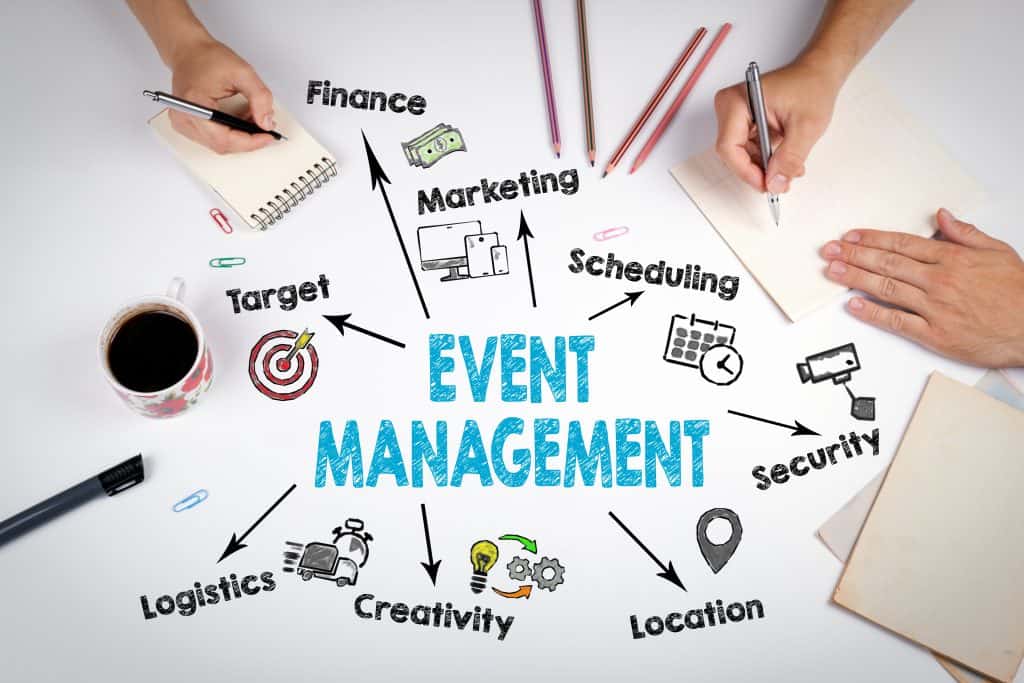Looking to advance your career as an events manager, but unsure of how? Believe it or not, you don’t necessarily need a specific degree to make it in this dynamic field. This blog offers insights on the qualifications, skills and various career paths available for aspiring event managers.
Stick around – there’s so much more to explore!
Key Takeaways
- Becoming an events manager doesn’t require a specific degree, but having qualifications in event management, hospitality, or marketing can be beneficial.
- Strong organizational skills and effective communication are crucial for success as an events manager.
- Event managers have the opportunity to start in entry – level positions and progress to senior or management roles over time.
- They can also work as event coordinators within the industry or freelance/start their own event management company.
Understanding the Role of an Events Manager

An events manager has a busy job. The person in this role talks to clients and helps them pick the best options for their event. These might be meetings, parties or shows. Every part of an event is in the hands of the events manager.
This job calls for team work. The events manager works with others to make sure each event runs smoothly. He or she uses many skills like organising tasks, getting along with people and making good decisions quickly.
It’s also useful to talk well and do many things at once in this job.
Qualifications and Education for Events Managers

Event managers do not have specific degree requirements, but having a diploma or certificate in Event Management can be beneficial. Additionally, some event managers may choose to pursue a Master’s degree in Tourism or Hospitality Management to further enhance their qualifications.
No specific degree requirements
Event management does not need a special degree. This makes it easy for anyone to start an event manager job. All you need is a keen mind, good planning skills and the ability to work with people.
Going to school for this job can help, but it is not a must. Many successful event managers did not go to college for this line of work. They learned on the job and used their personal skills to oversee events.
So, don’t worry if you don’t have a degree in event management!
Diploma or certificate in Event Management

You can earn a diploma or certificate in Event Management. This helps you learn the skills for an event manager job. Schools like STADIO offer this kind of study program. It is career-focused and teaches you about many parts of event management.
The course talks about how to plan, organise, and oversee events big and small. Some people even take this diploma online! You do not need years of experience to start this course.
After studying, you could become an Event Manager or fill other roles in hospitality and marketing.
Master’s degree in Tourism or Hospitality Management
Having a master’s degree in Tourism or Hospitality Management can give you an edge. This type of degree dives deep into topics like tourism, event planning and coordination. It gives you the tools to deal with global work in tourism, events and hospitality.
So, if you dream big as an events manager, this could be your path!
Detailed Job Description of an Events Manager
An event manager job is full of tasks. They plan, run and check all parts of an event. This could be a small party or a big concert! They start by speaking to the client about what they want from the event.
Then, the events manager makes plans for where it will be, who will work on it and how long it will take.
They also have to pick who provides food, music and other important parts of an event. It’s not just planning ahead that matters though – they have to make sure everything goes well on the day too! Event managers deal with any problems quickly so everyone enjoys themselves.
At the end, they look at how well things went to do even better next time.
Essential Skills for Events Managers
Events managers need to possess strong organizational skills, creativity and innovation, excellent communication and interpersonal skills, attention to detail, as well as problem-solving and decision-making abilities.
Strong organizational skills
Good event managers have strong organizing skills. They can juggle several tasks at once and still keep everything in order. Being well-organized helps them run events smoothly, from start to finish.
Without good organization, an event may not go as planned or meet its goals. A neat plan for each part of the event keeps chaos away and makes sure everyone knows their roles. This way the manager can keep track of all activities under his supervision easily.
Creativity and innovation
Event managers need to think outside the box. Creativity and innovation help them craft unique event themes and stick to their budgets. A great event manager can turn a small idea into a big, fun event.
This skill lets an event manager stand out in the crowd. Also, it helps in smart labor use for each task. With time and practice, anyone can get better at this skill. So, all new or hoping-to-be-event managers should work on being more creative every day.
Excellent communication and interpersonal skills
Event managers need to have excellent communication and interpersonal skills. These skills are considered essential for success in the field. Event managers must be able to effectively communicate with a wide range of people, including C-suite executives, event attendees, sponsors, and team members.
Strong interpersonal skills are crucial for ensuring that everyone on the team understands their roles and responsibilities. Communication skills also involve being respectful, thoughtful, and open to criticism.
With good communication and interpersonal skills, event managers can create a positive working environment and build strong relationships with clients and stakeholders.
Attention to detail
Attention to detail is a crucial skill for events managers. It means being thorough and paying close attention to every small aspect of an event. Events managers need this skill because they have to coordinate and oversee all the details of parties, celebrations, or conferences.
They must make sure everything runs smoothly and without any mistakes. Attention to detail also involves strong organizational skills, such as creating detailed planning documents and checklists.
By having this skill, events managers can ensure that nothing gets overlooked or forgotten during the planning and execution of an event. Taking courses in event planning or management can help develop attention to detail skills needed for becoming an effective events manager.
Problem-solving and decision-making abilities
Problem-solving and decision-making abilities are crucial skills for event managers. These skills are necessary for all levels of positions, not just senior roles. Event organizers need to think on their feet, adapt quickly, and come up with creative solutions when faced with challenges or unexpected situations.
Problem-solving skills also develop over time and with experience in the industry. Being able to research effectively is another essential skill as it helps event managers gather information and make informed decisions.
So, having strong problem-solving and decision-making abilities will greatly contribute to the success of an events manager in planning and executing successful events.
Career Path and Job Opportunities

Event managers can start their careers in entry-level positions in event planning or coordination, with the opportunity to progress to senior or management roles over time. Another option is to work as an event coordinator within the industry or even freelance or start their own event management company.
Entry-level positions in event planning or coordination
Entry-level positions in event planning or coordination are an excellent starting point for aspiring events managers. These roles provide valuable hands-on experience and practical knowledge in the events industry.
Positions such as event planner, wedding planner, venue manager, sponsorship coordinator, and catering manager fall under this category. In these roles, individuals assist with organizing and executing conferences, exhibitions, promotions, and various business and social events.
By starting at the entry level, individuals can gain a solid foundation in event management while developing the necessary skills and qualifications for advancement in their careers.
Progression to senior or management roles
As an event manager gains experience and proves their skills, they have the chance to move up to senior or management positions. This means they can take on more responsibility and oversee larger events with bigger budgets.
They may also have the opportunity to work on high-profile events and projects, which can help further build their reputation in the industry. By networking and building relationships with other professionals in the field, event managers can increase their chances of career progression.
It’s important for event managers to stay updated with industry trends and developments so that they can continue delivering innovative and memorable events as they advance in their careers.
The Role of an Event Coordinator in the industry
Event coordinators play a crucial role in the event management industry. They are responsible for organizing and coordinating various types of events, including meetings, conferences, exhibitions, promotions, and social gatherings.
Their main focus is to ensure that all aspects of the event run smoothly and efficiently. This involves tasks such as venue selection, budgeting, contract negotiation with vendors, managing logistics and timelines, coordinating with speakers or performers, marketing and promotion of the event, and overseeing on-site operations.
Strong organizational skills are essential for event coordinators to effectively manage multiple tasks and deadlines. They also need excellent communication and interpersonal skills to build relationships with clients, vendors, sponsors, attendees,and other stakeholders involved in the event.
Freelancing or starting your own event management company
Event management professionals have the option to work as freelancers or start their own event management companies. Freelancing allows for greater flexibility and independence in your work.
You can choose the projects you want to take on, set your own schedule, and work with different clients. Starting your own event management company provides stability and support from an established organization.
It gives you the opportunity to build a team, grow your client base, and offer a wider range of services. Whichever path you choose, the event management industry offers plenty of opportunities for career growth and success.
Professional Development and Resources

Networking and building industry connections. Continuous learning and staying updated with industry trends. Professional certifications and memberships. Discover the essential resources for becoming a successful events manager – read more to find out how you can take your career to the next level!
Networking and building industry connections
Networking is an important aspect of career development for business owners. It can help you expand your knowledge, opportunities, and connections in the industry. Here are some key points to remember:
- Networking provides access to job opportunities and professional connections.
- It allows you to gain valuable career advice and new ideas.
- Building connections can lead to growth for your company, including recruitment leads and opportunities.
- Effective networking helps build relationships with a wide range of people, leading to new opportunities and skills.
- It’s not just about trading information but also about creating long – term mutually beneficial relationships.
- Professional networking can help you meet prospective clients and get ahead in your career.
Continuous learning and staying updated with industry trends
Continuous learning and staying updated with industry trends are essential for business owners in order to stay competitive and succeed in the ever-evolving market. Here are some key reasons why continuous learning is important:
- Expands skill sets: Continuous learning allows business owners to acquire new skills and knowledge that can be applied to their businesses. It equips them with the necessary tools to adapt to changes and implement innovative strategies.
- Increases performance and productivity: By staying updated with industry trends, business owners can identify opportunities for improvement and implement best practices. This leads to improved performance and increased productivity within their businesses.
- Stimulates creativity and innovation: Continuous learning exposes business owners to new ideas, perspectives, and technologies. This stimulates creativity and innovation, enabling them to develop fresh solutions for challenges they may encounter.
- Enhances competitiveness: In a rapidly changing market, knowledge becomes a valuable asset for business owners. Staying updated with industry trends allows them to anticipate changes, identify emerging opportunities, and make informed decisions that give them a competitive edge.
- Boosts professional growth: Continuous learning demonstrates a willingness to adapt and improve, which is vital for professional growth as a business owner. It positions them as proactive leaders who are committed to developing themselves and their businesses.
Professional certifications and memberships
Professional certifications and memberships in the field of event management can greatly enhance your skills and qualifications, opening up new opportunities for career advancement. Here are some important ones to consider:
- Certified Meeting Professional (CMP): This globally recognized certification demonstrates your expertise in meeting planning, including logistics, budgeting, and risk management.
- Certified Special Events Professional (CSEP): This certification is ideal for those who specialize in creating unique and memorable events. It covers areas such as event design, production, and marketing.
- Certified Event Planner (CEP): This certification focuses on the fundamental skills needed to plan and execute successful events, including budgeting, contract negotiations, and vendor management.
- International Live Events Association (ILEA) Membership: Becoming a member of ILEA provides access to valuable networking opportunities with professionals in the industry. It also offers educational resources and discounts on event-related products and services.
- Meeting Professionals International (MPI) Membership: MPI is a global association for meeting planners that offers professional development resources, networking events, and access to industry research.
- Event Management Association (EMA) Membership: EMA provides a platform for event managers to connect with peers, share best practices, and stay informed about industry trends through conferences, webinars, and publications.
Conclusion
To become an events manager, you don’t need a specific degree, but it can be helpful to have qualifications in event management, hospitality, or marketing. Strong organizational skills and effective communication are crucial for success in this role.
The events industry offers exciting opportunities for career progression, with the chance to work on diverse projects and advance to senior positions like event director or head of events.
So get ready to plan amazing events and create memorable experiences!
What Are the Career Opportunities in Events Management?
Career options in events management are diverse and exciting. Professionals in this field can work in event planning, project management, marketing, and hospitality. They can organize conferences, weddings, corporate gatherings, and cultural events. With the demand for experiences increasing, job prospects in events management are promising, offering opportunities for creativity and innovation.
What Are the Key Elements of Event Contract Management in the Events Management Career Path?
Efficient event contract management is crucial in the events management career path. Key elements include clearly defining the event’s purpose, scope, and deliverables, as well as establishing a timeline and budget. A comprehensive contract should cover all aspects, including payment terms, cancellation policies, and indemnification clauses. Regular monitoring and communication play a vital role in ensuring that contractual obligations are met and potential risks are mitigated. Overall, efficient event contract management ensures successful events and client satisfaction.
FAQs
1. What do I need to become an events manager?
To be an events manager, you will need the right skills and qualifications. Marketing plays a big part in this job too.
2. How much money does an events manager make?
The salary of an events manager can vary. It depends on where you are and what kind of event you run.
3. Can I work as an Events Manager in South Africa?
Yes, you can work as an Events Manager in South Africa if you have proper skills and qualifications.
4. Does being good at marketing help me to be a better events manager?
Yes, being good at marketing is key for an Event Manager because it helps attract people to your event.




